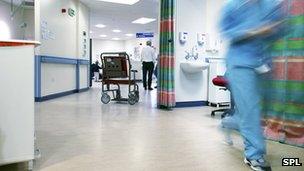Hospital 'bed blocking' pressure worry for older patients
- Published

Patients must not be left to fend for themselves at a difficult time, the charity warns
Older patients should not be put under pressure to leave hospital before they feel ready to do so, a charity warns.
It follows Health Minister Mark Drakeford's announcement of measures to cut waiting times for urgent hospital treatment by tackling "bed blocking".
An estimated 275 beds are currently used in Wales by mainly elderly patents who are well enough to leave hospital.
The charity Age Cymru says appropriate support must be made available for patients and families before discharge.
Mr Drakeford outlined new measures on Tuesday to ease hospital pressures after a spike in demand for accident and emergency (A&E) services.
A&E consultants have warned that their departments are at "meltdown" point because of overcrowding and a bed shortage.
The minister said problems at the "front doors" of hospitals were made worse when beds were occupied by patients ready for discharge.
He explained: "Of course, anyone must have the right to pursue the long-term care arrangements which are best for them.
"That does not, and cannot, amount to a right to occupy an acute hospital bed while those arrangements are being realised."
Graeme Francis, head of policy and public affairs for Age Cymru, welcomed the aim of ensuring that people were cared for in the most appropriate place.
He said it was unacceptable that many older people were forced to stay in hospital for longer than needed because of delays in assessing their needs or arranging suitable places for them to be discharged to.
"We must develop a system where the help and support that somebody needs on discharge can be put in place quickly, whether that is back at home or in a residential or nursing home," he said.
"However, it would not be right for older people or their families to be put under pressure to leave hospital before they are able to do so.
"The right support and information must be provided so that people aren't left to fend for themselves at an extremely difficult and emotional time."
On Tuesday, Mr Drakeford promised a change in policy for cases when the health service and social services cannot agree on who is responsible for funding care.
People in those disputes should enter interim accommodation, he said.
Health adviser Baroness Ilora Finlay and Mario Kreft of Care Forum Wales speak to BBC Radio Wales
There has been a big increase in demand on hospital A&E departments over recent months.
Ambulances spent almost 55,000 hours - equivalent to more than six years - waiting outside Welsh hospitals in six months, according to figures obtained by the BBC.
However, a number of community hospitals have been earmarked for closure in plans to re-organise health services across Wales.
On Monday, nearly 200 people attended a public meeting to discuss plans to close Gellinudd Hospital in Pontardawe, which campaigners say is a valuable resource for elderly patients recovering after hospital treatment.
- Published23 April 2013
- Published23 April 2013
- Published15 April 2013
- Published13 March 2013
- Published12 March 2013
- Published5 March 2013